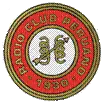Radio Club Peruano
The Radio Club Peruano (RCP) (in English, literally Radio Club of Peru) is a national non-profit organization for amateur radio enthusiasts in Peru. RCP was founded on December 6, 1930, and the first General Meeting of the organization was held in the halls of the Library of the Geographical Society in Lima, Peru in January, 1931.[1] The RCP operates a QSL bureau for those amateur radio operators in regular contact with amateur radio operators in other countries, and supports amateur radio operating awards and radio contests. Radio Club Peruano represents the interests of Peruvian amateur radio operators before national and international regulatory authorities.[2] RCP is the national member society representing Peru in the International Amateur Radio Union.[3]
 | |
| Abbreviation | RCP |
|---|---|
| Formation | December 6, 1930[1] |
| Type | Non-profit organization |
| Purpose | Advocacy, Education |
| Location | |
Region served | Peru |
Official language | Spanish |
President | César Brousek Delboy OA4CLU |
| Affiliations | International Amateur Radio Union |
| Website | http://www.oa4o.org/ |
Club Repeaters
Radio Club Peruano (RCP) operates four repeaters in the Lima metropolitan area, three within the two meter amateur radio allocation and one in the 70 centimeter amateur radio allocation. One of the three 2 meter repeaters is dual analog and digital use, DMR being the digital encoding used. DMR has dual talk channels.
| Frequency | Offset | Tone | Location | Country | Call | Use | Modes |
|---|---|---|---|---|---|---|---|
| 146.88000 | -0.6 MHz | CC1 | Lima, Repetidora 3 | PE | OA4O | OPEN | DMR |
| 146.96000 | -0.6 MHz | 82.5 | Lima, Repetidora 1 | PE | OA4O | OPEN | |
| 147.05000 | +0.6 MHz | 82.5 | Lima | PE | OA4O | OPEN | |
| 434.35000 | +5 MHz | 82.5 | Lima | PE | OA4O | OPEN |
| DMR Enabled | |
| Color Code: | 1 |
| DMR ID: | 716003 |
RENER
The National Amateur Radio Emergency Network (RENER) is a network made up of ALL Radio amateurs in Peru who have the desire and predisposition to provide support in situations in which help is needed by making emergency communications at the local and national level.
| HF: | MODE | TONE | Emergency Use Description |
| 3,730.0 kHz | (LSB) | Provinces phone link | |
| 7,078.0 kHz | (USB) | Digital Modes (JS8CALL) Local and International Link | |
| 7,100.0 kHz | (LSB) | Local and International Link - Primary Frequency | |
| 7,133.0 kHz | (LSB) | Local Link - Secondary Frequency | |
| 14,078.0 kHz | USB) | Digital Modes (JS8CALL) Local and International | |
| 14,137.0 kHz | (USB) | International Link - Primary Frequency | |
| 14,163.0 kHz | (USB) | International Link - Secondary Frequency | |
| 10,345.0 kHz | (USB) | RENER - INDECI link | |
| VHF: | |||
| 146.960 Mhz | (-600 kHz) | Tone 82.5 | Primary - RPT 1 (Lima) |
| 146.520 Mhz | (Direct) | RENER Emergency Frequency | |
| 147.050 Mhz | (+600 kHz) | Tone 82.5 | Secondary RPT 2 (Callao) |
See also
References
- Radio Club Peruano (2008). "Historia del Radio Club Peruano" Archived 2008-09-08 at archive.today. Retrieved Sep. 10, 2008.
- Radio Club Peruano (2008). Radio Club Peruano official web site. Retrieved Sep. 10, 2008.
- International Amateur Radio Union (2008). "Member Societies". Retrieved Aug. 1, 2008.
Newspaper article in 'El Comercio' of Lima, Peru about RCP Retrieved 2010-03-13